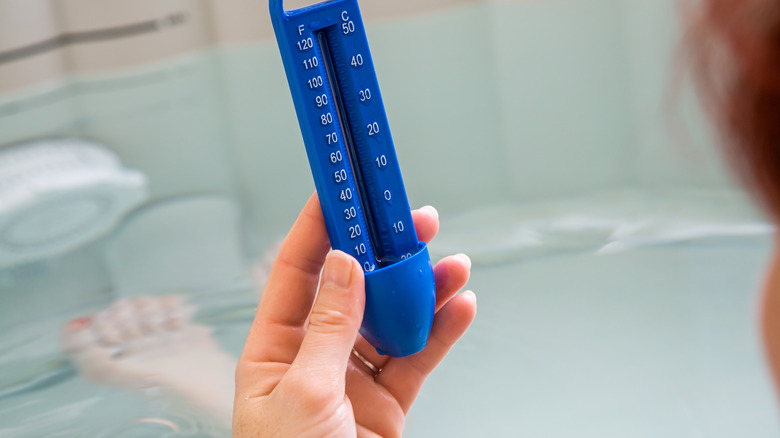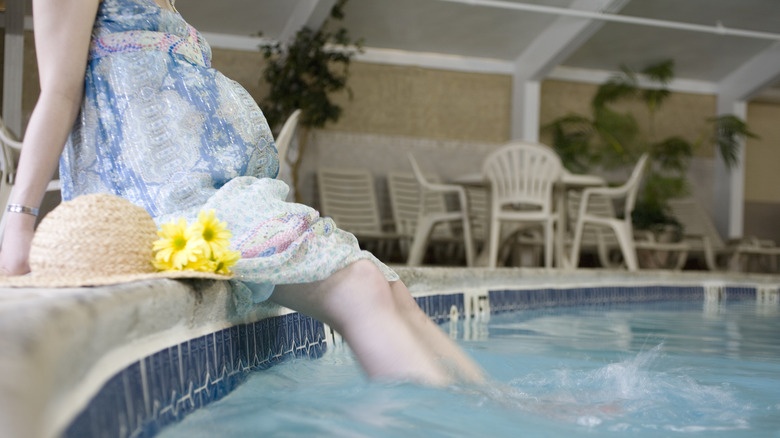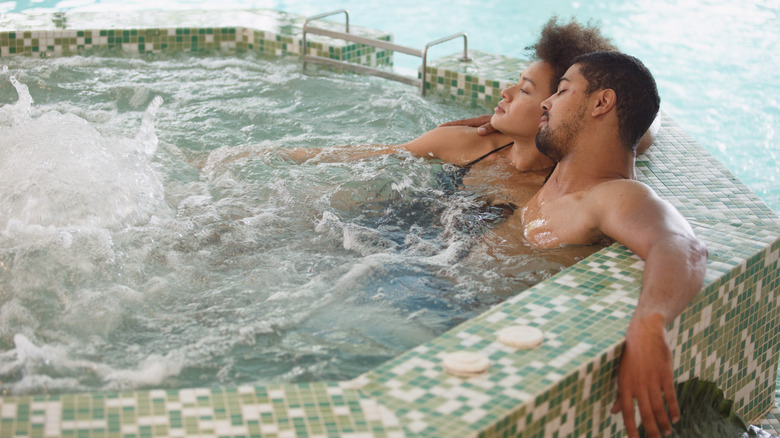What Really Happens To Your Body When You Sit In A Hot Tub
No well-earned vacation is complete without a soak in a hot tub. Hot tubs are all about relaxation and setting a mood. You've probably felt these effects yourself firsthand, but have you ever wondered what may be going on physically inside your body while enjoying those swirling hot jets? We did some digging and it turns out that hot tubs can offer us some major health benefits, as long as we are mindful to avoid their potential risks.
First off, there are mental and emotional benefits to be gained from sitting in a hot tub. Not only does the warming effect of a hot tub promote one's quality of sleep, but doing so right before bed will quicken the rate at which you're able to fall asleep and reduce the chances of waking up in the middle of the night (via Ferrari Pools, Patios & Spas). Additionally, stress can be hazardous to our health, but a hot tub can take care of that through its mood-boosting effects. The massage of the jets coupled with that easygoing floating sensation can help reduce anxiety.
Hot tubs can also have physical benefits for our body. Sitting in a hot tub prompts an increase in blood circulation, which can reduce joint inflammation from arthritis, regulate blood pressure, and rejuvenate skin. In addition, the release of muscle tension while in a hot tub can help relieve painful migraines.
How long is too long to sit in a hot tub?
A word of caution about hot tubs: soaking for too long can negatively impact your health. According to Swim World, a soak lasting too long can cause dizziness and nausea from prolonged exposure to temperatures higher than your normal body temperature. For this reason, it's important to factor in certain potential risks when considering a hot tub dip, such as age, health, and the temperature of both the weather and the water itself.
Most standard hot tubs are kept between 100 and 102 degrees and soaks should be kept between 15 to 30 minutes for most healthy adults, according to Swim World. Be sure to abide by any age restrictions in place by the facility, as young children may or may not be permitted in the hot tub. You'll want to take extra care to check the temperature of the hot tub, but on average, children should limit their time in the hot tub to around 5 minutes, though older children can be limited to up to 20 minutes.
Hot tub users should also avoid going back and forth between the pool and the hot tub, as rapid temperature changes can negatively impact one's blood pressure.
Who should avoid hot tub use?
It's important to remember that certain conditions call for caution and avoidance of hot tub use to ensure your well-being and safety. For instance, if you're pregnant, you should exercise caution when using hot tubs. According to the University of Pittsburgh Medical Center, prolonged exposure to high water temperatures can potentially harm the developing fetus.
Also, The Epilepsy Association of The Maritimes states that hot water can trigger seizures in some people. If you have epilepsy or other seizure disorders, make sure you only use a hot tub with someone you know and trust who could lift you out of the hot tub and provide treatment, if needed (per Cleveland Clinic). Similarly, if you have blood pressure or heart issues, hot tubs might not be the best choice for you. The heat and pressure of the water could raise your blood pressure and heart rate, potentially leading to a life-threatening event. Overheating can also cause a sharp drop in blood pressure, which can also be dangerous.
Additionally, it's important to note that if you're experiencing diarrhea, vomiting, an open wound, or any kind of infection or illness, it's best to avoid hot tubs. This is because these conditions have the potential to contaminate the water, which can pose health risks not only to you, but to others as well
Other considerations and advice for sitting in a hot tub
There are other crucial factors to consider for safe and beneficial hot tub use. For example, it's best to avoid combining hot tubs with alcohol or other mind-altering substances, as well as medications that may induce drowsiness, affect blood pressure, or have other side effects that could be aggravated by hot tub conditions.
If you're looking forward to a relaxing soak in a hot tub, it's vital to make sure it's taken care of. According to the Centers for Disease Control and Prevention (CDC), hot tubs can be a source of Legionnaires' disease, a type of pneumonia that can be contracted by inhaling small water droplets containing Legionella bacteria, if not properly maintained. For a worry-free experience, choose a hot tub that's regularly cleaned and maintained to the highest standards.
Remember to drink plenty of water before and after your hot tub session to stay hydrated and avoid feeling overheated. Also, be mindful of how long you spend in the hot tub so you don't accidentally overdo it. If you have any concerns about using a hot tub, especially if you have underlying health issues, it's always a good idea to talk to your healthcare provider first. They can give you personalized advice and help you stay safe and healthy while enjoying your hot tub experience.




